The history of English language(英汉双语)
The History of English
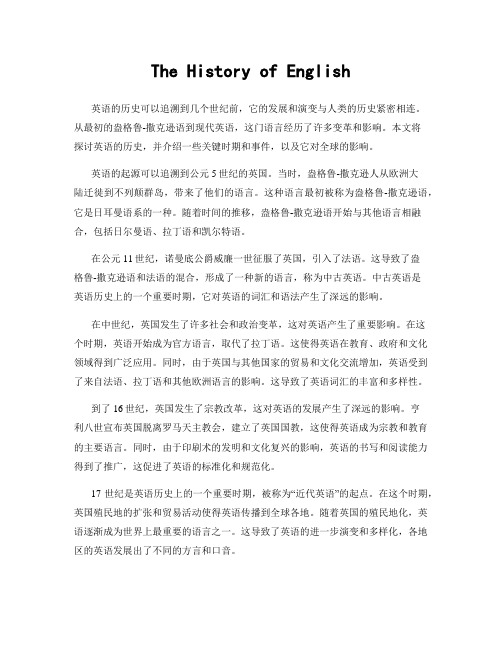
The History of English英语的历史可以追溯到几个世纪前,它的发展和演变与人类的历史紧密相连。
从最初的盎格鲁-撒克逊语到现代英语,这门语言经历了许多变革和影响。
本文将探讨英语的历史,并介绍一些关键时期和事件,以及它对全球的影响。
英语的起源可以追溯到公元5世纪的英国。
当时,盎格鲁-撒克逊人从欧洲大陆迁徙到不列颠群岛,带来了他们的语言。
这种语言最初被称为盎格鲁-撒克逊语,它是日耳曼语系的一种。
随着时间的推移,盎格鲁-撒克逊语开始与其他语言相融合,包括日尔曼语、拉丁语和凯尔特语。
在公元11世纪,诺曼底公爵威廉一世征服了英国,引入了法语。
这导致了盎格鲁-撒克逊语和法语的混合,形成了一种新的语言,称为中古英语。
中古英语是英语历史上的一个重要时期,它对英语的词汇和语法产生了深远的影响。
在中世纪,英国发生了许多社会和政治变革,这对英语产生了重要影响。
在这个时期,英语开始成为官方语言,取代了拉丁语。
这使得英语在教育、政府和文化领域得到广泛应用。
同时,由于英国与其他国家的贸易和文化交流增加,英语受到了来自法语、拉丁语和其他欧洲语言的影响。
这导致了英语词汇的丰富和多样性。
到了16世纪,英国发生了宗教改革,这对英语的发展产生了深远的影响。
亨利八世宣布英国脱离罗马天主教会,建立了英国国教,这使得英语成为宗教和教育的主要语言。
同时,由于印刷术的发明和文化复兴的影响,英语的书写和阅读能力得到了推广,这促进了英语的标准化和规范化。
17世纪是英语历史上的一个重要时期,被称为“近代英语”的起点。
在这个时期,英国殖民地的扩张和贸易活动使得英语传播到全球各地。
随着英国的殖民地化,英语逐渐成为世界上最重要的语言之一。
这导致了英语的进一步演变和多样化,各地区的英语发展出了不同的方言和口音。
到了18世纪和19世纪,英国的工业革命和科学进步对英语的发展产生了巨大影响。
科学、技术和工业术语的出现丰富了英语的词汇。
同时,英国的文学和艺术繁荣,众多作家和诗人的作品使得英语的文学价值得到了全球的认可。
The History of English__ LanguagePPT课件

Indo-European and Germanic Influences English is a member of the Indo-European family of languages. This broad family includes most of the European languages spoken today. The IndoEuropean family includes several major branches: Latin and the modern Romance languages; The Germanic languages; The Indo-Iranian languages, including Hindi and Sanskrit;( 印地语; 梵语) The Slavic languages; ( 斯拉夫语) The Baltic languages of Latvian and Lithuanian) ( 波 罗地,拉脱维亚,立陶宛) The Celtic languages; Greek.
The Norman Conquest and Middle English (11001500) William the Conqueror, the Duke of Normandy, invaded and conquered England and the AngloSaxons in 1066 AD. The new overlords spoke a dialect of Old French known as Anglo-Norman. The Normans were also of Germanic stock and Anglo-Norman was a French dialect that had considerable Germanic influences in addition to the basic Latin roots.
History of the English Language
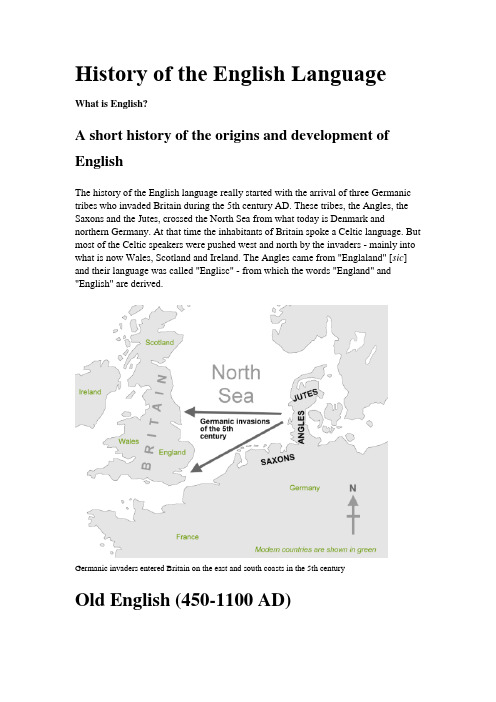
History of the English LanguageWhat is English?A short history of the origins and development of EnglishThe history of the English language really started with the arrival of three Germanic tribes who invaded Britain during the 5th century AD. These tribes, the Angles, the Saxons and the Jutes, crossed the North Sea from what today is Denmark and northern Germany. At that time the inhabitants of Britain spoke a Celtic language. But most of the Celtic speakers were pushed west and north by the invaders - mainly into what is now Wales, Scotland and Ireland. The Angles came from "Englaland" [sic] and their language was called "Englisc" - from which the words "England" and "English" are derived.Germanic invaders entered Britain on the east and south coasts in the 5th centuryOld English (450-1100 AD)The invading Germanic tribes spoke similar languages, which in Britain developed into what we now call Old English. Old English did not sound or look like English today. Native English speakers now would have greatdifficulty understanding Old English. Nevertheless, about half of the most commonly used words in Modern English have Old English roots. The words be , strong and water , forexample, derive from Old English. Old English was spoken until around 1100.Middle English (1100-1500)In 1066 William the Conqueror, the Duke of Normandy (part of modern France), invaded and conqueredEngland. The new conquerors (called the Normans) brought with them a kind of French, which became the language of the Royal Court, and the ruling and business classes. For a period there was a kind of linguistic class division, where the lower classes spoke English and the upper classes spoke French. In the 14th century English became dominant in Britain again, but with many French wordsadded. This language is called Middle English. It was the language of the great poet Chaucer (c1340-1400), but it would still be difficult for native English speakers to understand today.Modern EnglishEarly Modern English (1500-1800)Towards the end of Middle English, a sudden and distinct change in pronunciation (the Great Vowel Shift) started, with vowels being pronounced shorter and shorter.Part of Beowulf , a poem written in Old English An example of Middle English by ChaucerFrom the 16th century the British had contact with many peoples from around the world.This, and the Renaissance of Classical learning, meant that many new words and phrases entered the language. The invention of printing also meant that there was now a common language in print. Books became cheaper and more people learned to read. Printing also brought standardization to English. Spelling and grammar became fixed, and the dialect of London, where most publishinghouses were, became the standard. In 1604 the first English dictionary was published. Late Modern English (1800-Present)The main difference between Early Modern English and Late Modern English is vocabulary. Late Modern English has many more words, arising from two principal factors: firstly, the Industrial Revolution and technology created a need for new words; secondly, the British Empire at its height covered one quarter of the earth's surface, and the English language adopted foreign words from many countries.Varieties of EnglishFrom around 1600, the English colonization of North America resulted in the creation of a distinct American variety of English. Some English pronunciations and words "froze" when they reached America. In some ways, American English is more like the English of Shakespeare than modern British English is. Some expressions that the British call "Americanisms" are in fact original British expressions that were preserved in the colonies while lost for a time in Britain (for example trash for rubbish, loan as a verb instead of lend, and fall for autumn; another example,frame-up , was re-imported into Britain through Hollywood gangster movies). Spanish also had an influence on American English (and subsequently British English), with words like canyon , ranch , stampede and vigilante being examples of Spanish words that entered English through the settlement of the American West. French words(through Louisiana) and West African words (through the slave trade) also influenced American English (and so, to an extent, British English).Hamlet's famous "To be, or not to be" lines, written inEarly Modern English by ShakespeareToday, American English is particularly influential, due to the USA's dominance of cinema, television, popular music, trade and technology (including the Internet). But there are many other varieties of English around the world, including for example Australian English, New Zealand English, Canadian English, South African English, Indian English and Caribbean English.The Germanic Family of LanguagesEnglish is a member of the Germanic family of languages. Germanic is a branch of the Indo-European language family.。
The History of English Language
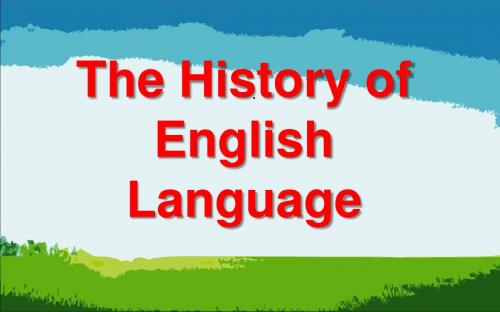
.
Questions: .
1:How many language families in the world? 2:Which language familiy does English belong to?
Indo-European family印欧语系 . Sino-Tibetan family汉藏语系 Altaic family阿尔泰语系 Semito-Hamitic family闪-含语系 Ural language family乌拉尔语系 Ibero - Caucasus family高加索语系 Dravidian family达罗毗荼语系 Austro-Asiatic family南亚语系 Austronesia family 南岛语系
Bede and His Works
Bede(673-735) also referred to as Saint Bede or the Venerable Bede . . Anglo-Saxon He is widely regarded as the greatest of all the scholars. He wrote around 40 books mainly dealing with theology and history.
The evolution of old english (500-1100AD)
Also influencing English at this time were the Vikings. Norse invasions and settlement, beginning around 850, brought many North Germanic words into the language, particularly in the north of England. Some examples are dream, which had meant 'joy' until the Vikings imparted its current meaning on it from the Scandinavian cognate draumr, and skirt, which continues to live alongside its native English cognate shirt.
英语的发展史和介绍
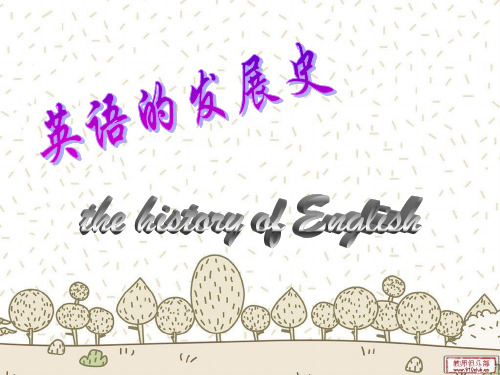
英语的历史从1500多年前的北欧开始。 在公元5世纪左右,称为盎格 鲁人、撒克逊人和朱特人的部落从德国和丹麦旅行向西过北海。他们 迁入英国,并在7世纪末以前,他们所讲的即为早期形式的英语。
Middle English
AD1100—AD1500
In 1066, the Normans conquered England. French became the language of the wealthy and powerful, and English was spoken mostly by poorer people. In the late fourteenth century, English became the first language again. By this time, many words used in English came from French or Latin, and a lot of the early words no
Modern English
In the Renaissance(文艺t in ancient Greece and ancient Roman culture .English has absorbed a large number of ancient society culture. vocabulary has greatly increased.
• 公元1066年,法国的诺曼蒂公爵侵人英 国,在诺曼蒂王朝统治期间,英国实际 上存在着三种语言:法语,拉丁语,英语, 但是英语只是下层社会劳动者用的世俗 语言。法语在英国的特殊地位一直延续 到14世纪。
• 1382年用英语书写的圣经出现,才结束 了拉丁语的宗教语言地位。这时英语才 成为英国的全民语言。因此英语中保留 着大量的法语词汇(如age,air,brush, cry,bourgeoisie)和拉丁语词汇 (angel,candle,moke,pope)。
the_history_of_English_Language课件
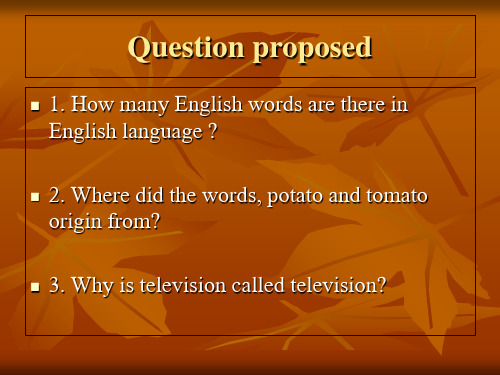
The number of modern English words 200,000
Questions
What do you think is the characters of development of English language ?
Question proposed
1. How many English words are there in English language ?
The Influences on Old English:
tin
Latin is first introduced into English when England was under the conquer of Romans Empire before 3rd century.
.
Literature---
stanza, canto
Art---
studio, vista, replica
Music---
opera, solo, alto, piano
Shakespeare’ works
Later Modern English
The influence of Industrialization and colonization: (1800-)
Characters of English
L:anguage of this time
Large number of foreign language absorbed into English language
Turkey and Arabia: coffee, cotton, turban… Persia: bazaar, pajama Far East: Tea, bamboo, curry, sago .. North America: potato, tomato
The history of English language(英语历史)【高英第二册第一课相关索引】
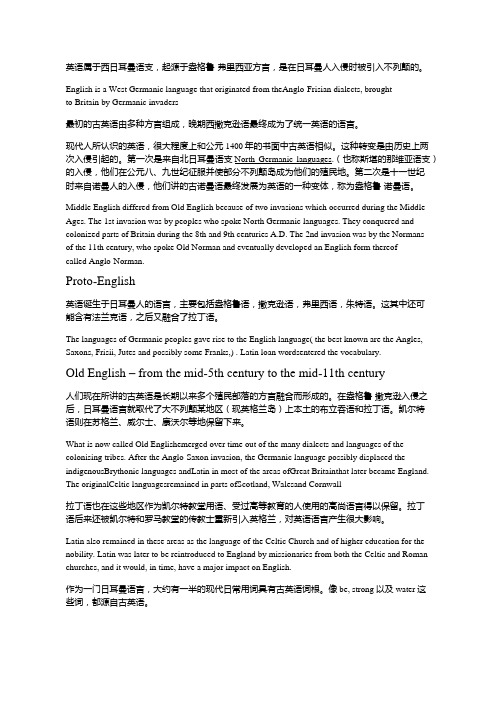
英语属于西日耳曼语支,起源于盎格鲁-弗里西亚方言,是在日耳曼人入侵时被引入不列颠的。
English is a West Germanic language that originated from theAnglo-Frisian dialects, broughtto Britain by Germanic invaders最初的古英语由多种方言组成,晚期西撒克逊语最终成为了统一英语的语言。
现代人所认识的英语,很大程度上和公元时来自诺曼人的入侵,他们讲的古诺曼语最终发展为英语的一种变体,称为盎格鲁-诺曼语。
Middle English differed from Old English because of two invasions which occurred during the Middle Ages. The 1st invasion was by peoples who spoke North Germanic languages. They conquered and colonized parts of Britain during the 8th and 9th centuries A.D. The 2nd invasion was by the Normans of the 11th century, who spoke Old Norman and eventually developed an English form thereofcalled Anglo-Norman.Proto-English英语诞生于日耳曼人的语言,主要包括盎格鲁语,撒克逊语,弗里西语,朱特语。
这其中还可能含有法兰克语,之后又融合了拉丁语。
The languages of Germanic peoples gave rise to the English language( the best known are the Angles, Saxons, Frisii, Jutes and possibly some Franks,) . Latin loan wordsentered the vocabulary.Old English – from the mid-5th century to the mid-11th century人们现在所讲的古英语是长期以来多个殖民部落的方言融合而形成的。
History of English

The Celts found too late that their new allies had become their conquerors. Fierce seesaw battles raged for some 200 years as the Celts resisted the invasion.
The vowels of OE would probably sound more like those of modern European languages such as German than like Modern English vowels.
2.1.5.3 The vocabulary of OE
2.1.5.2 The pronunciation of OE
The consonants of OE would be similar to those of Modern English in many ways, but there would be differences. One difference is that: The [h] that is little more than a breath in Mod.E would be a tighter, more distinct sound in OE—a close approximation is the sound represented by the ch in the Scottish word loch (lake).
2.1.4 The Danish influence
About 790 the Danes became a serious threat to England. Battles between the English and the Danes raged for nearly ninety years. Alfred the Great led his people fighting against them. At last the Danes gained the upper hand. The exciting tales of this period have come down to us in the story of Beowulf.
- 1、下载文档前请自行甄别文档内容的完整性,平台不提供额外的编辑、内容补充、找答案等附加服务。
- 2、"仅部分预览"的文档,不可在线预览部分如存在完整性等问题,可反馈申请退款(可完整预览的文档不适用该条件!)。
- 3、如文档侵犯您的权益,请联系客服反馈,我们会尽快为您处理(人工客服工作时间:9:00-18:30)。
英语属于西日耳曼语支,起源于盎格鲁-弗里西亚方言,是在日耳曼人入侵时被引入不列颠的。
English is a West Germanic language that originated from theAnglo-Frisian dialects, broughtto Britain by Germanic invaders最初的古英语由多种方言组成,晚期西撒克逊语最终成为了统一英语的语言。
现代人所认识的英语,很大程度上和公元1400年的书面中古英语相似。
这种转变是由历史上两的入侵,他们在公元八、九世纪征服并使部分不列颠岛成为他们的殖民地。
第二次是十一世纪时来自诺曼人的入侵,他们讲的古诺曼语最终发展为英语的一种变体,称为盎格鲁-诺曼语。
Middle English differed from Old English because of two invasions which occurred during the Middle Ages. The 1st invasion was by peoples who spoke North Germanic languages. They conquered and colonized parts of Britain during the 8th and 9th centuries A.D. The 2nd invasion was by the Normans of the 11th century, who spoke Old Norman and eventually developed an English form thereofcalled Anglo-Norman.Proto-English英语诞生于日耳曼人的语言,主要包括盎格鲁语,撒克逊语,弗里西语,朱特语。
这其中还可能含有法兰克语,之后又融合了拉丁语。
The languages of Germanic peoples gave rise to the English language( the best known are the Angles, Saxons, Frisii, Jutes and possibly some Franks,) . Latin loan wordsentered the vocabulary.Old English – from the mid-5th century to the mid-11th century人们现在所讲的古英语是长期以来多个殖民部落的方言融合而形成的。
在盎格鲁-撒克逊入侵之后,日耳曼语言就取代了大不列颠某地区(现英格兰岛)上本土的布立吞语和拉丁语。
凯尔特语则在苏格兰、威尔士、康沃尔等地保留下来。
What is now called Old Englishemerged over time out of the many dialects and languages of the colonising tribes. After the Anglo-Saxon invasion, the Germanic language possibly displaced the indigenousBrythonic languages andLatin in most of the areas ofGreat Britainthat later became England. The originalCeltic languagesremained in parts ofScotland, Walesand Cornwall拉丁语也在这些地区作为凯尔特教堂用语、受过高等教育的人使用的高尚语言得以保留。
拉丁语后来还被凯尔特和罗马教堂的传教士重新引入英格兰,对英语语言产生很大影响。
Latin also remained in these areas as the language of the Celtic Church and of higher education for the nobility. Latin was later to be reintroduced to England by missionaries from both the Celtic and Roman churches, and it would, in time, have a major impact on English.作为一门日耳曼语言,大约有一半的现代日常用词具有古英语词根。
像 be, strong 以及 water 这些词,都源自古英语。
Old English varied widely from modern Standard English. Native English speakers today would find Old English unintelligible without studying it as a separate language. Nevertheless, English remains a Germanic language, and approximately half of the most commonly used words in Modern English have Old English roots. The words be, strong and water, for example, derive from Old English.很多非标准的方言,如苏格兰语、诺森伯兰语都保留了古英语的词汇和发音特点。
[5]古英语的使用,一直延续到了十二或十三世纪。
公元十、十一世纪,古英语受到了属于北日耳曼语支的古诺尔斯语的强烈影响。
包括阴阳性的丢失、格的变化(代词除外)。
英语大约从古诺尔斯语借用了两千个词条,比如:anger, bag, both, hit, law, leg, same, skill, sky, take 等等,还可能包括代词 they。
由于公元六世纪晚期基督教的引入,超过400个拉丁词被借用引入英语,包括:priest, paper, school 等词,以及一些较少的希腊语词汇。
古英语时期正式结束是在1066年诺曼征服后,诺曼人开始大规模影响英语语言时。
诺曼人讲的是一种叫古诺曼语的法语方言。
Middle English – from the late 11th to the late 15th century我们现在所称的中古英语是指诺曼语的影响是英语在受侵略后发生语言大转变的体现。
The Middle English we called now means the language producing from Norman influence is the hallmark of the linguistic shifts in English over the period of time following the invasion.诺曼征服后的几个世纪内,诺曼的国王以及高层贵族曾一度流行奥依语,该语言属法语的一种,称盎格鲁-诺曼语。
其使用范围甚至扩张到了不列颠群岛的其他地方,并受到北方奥依语方言的影响。
商人和较低阶层的贵族曾经同时使用盎格鲁-诺曼语和英语,英语仍然被视为普通人使用的语言。
英语也受到被其取代的凯尔特语言的影响,特别是布立吞语的影响。
最明显的是“进行时”的引入,它是许多现代语言特征,但它是在英语中更早地、更充分地被发展的。
English was also influenced by the Celtic languages it was displacing, especially the Brittonic substrate, most notably with the introduction of the continuous aspect, which is a feature found in many modern languages but developed earlier and more thoroughly in English.英语文学在1200年后重新出现,受那时的政治氛围和盎格鲁-诺曼语言不断衰落的影响,英语变得愈加受尊重(即地位不再处于普通人的语言之列)。
1362年爱德华三世成为首个用英语发表英国国会演讲的国王。
到了十四世纪末,就连贵族阶层也开始使用英语。
到这一时期,盎格鲁-诺曼语变成仅在小圈子内部使用的语言,后来就不再活跃了。
英语语言在中古英语时期经历了沧桑巨变,这种变化同时体现在语法和词汇上。
古英语是一门严重受到其他语言影响的语言,非常纷繁复杂。
但在中古英语时期,发生了词尾的全面精简。
大量的名词和形容词的词尾被简化为 -e,原有的语法差异随之遗失。
曾用于表示复数形式的词尾 -en 被大量简化为 -s,词的阴阳性被遗弃。
中古英语从法语(也有诺曼语)借用了大约一万个词,特别是政府、交通、法律、军队、时尚和饮食方面的词汇。
The English language changed enormously during the Middle English period, both in grammar and in vocabulary. While Old English is a heavily inflected language (synthetic), an overall diminishing of grammatical endings occurred in Middle English (analytic). Grammar distinctions were lost as manyand grammatical gender was discarded. Approximately 10,000 French (and Norman) loan words entered Middle English, particularly terms associated with government, church, law, the military,Early Modern English – from the late 15th to the late 17th century英语语言在十五世纪时,拼写方面已经相对稳定了,但语音上经历了许多巨大变化。
现代英语的语音的发展通常认为可追溯到开始于14世纪,大体完成于15世纪中期的元音大推移。
英语语音后来又在政府所用的以伦敦口音为基础的方言,以及印刷行业的的影响下产生变形。
